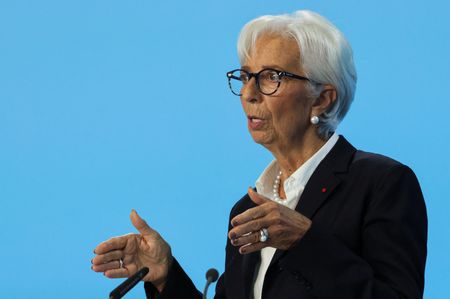FRANKFURT (Reuters) -The European Central Bank’s two top officials emphasised on Friday the central bank’s focus on bring down inflation in the euro area before it becomes entrenched.
Investors are trying to gauge how far the ECB is prepared to go in fighting double-digit growth in prices, with pressure on central banks across the world building after the Federal Reserve flagged more, albeit maybe smaller, interest rate hikes.
ECB President Christine Lagarde and her deputy, Luis de Guindos, both signalled the central bank was determined to do its part and called on the 19 governments of the euro zone to avoid fuelling prices with overly generous spending – a point also made by Greek governor Yannis Stournaras.
Lagarde acknowledged the ECB’s interest rate increases — which have taken its deposit rate from -0.5% to 1.50% in three months — worked with a lag, but she argued policymakers did not have the luxury of waiting to see their full effect.
“If we were to see, for example, inflation becoming more persistent and expectations being at risk of de-anchoring, we could not wait until the full impact of the policy measures materialises,” Lagarde said in a speech in Estonia.
“We would need to take additional actions until we are more confident that inflation will return to target in a timely manner,” she added.
Speaking in Spain, de Guindos also said the ECB had to “remain focused on reducing support for demand and guarding against the risk of a persistent upward shift in inflation expectations”.
Both he and Lagarde said governments should stick to “temporary” and “targeted” support for households affected by the current inflation crisis to avoid supporting demand.
In an interview published later on Friday, Greek central bank governor Stournaras said there was a trade off between fiscal and monetary policy.
“If fiscal policy is very relaxed, then, unfortunately, that means that interest rates are going to the sky, which we don’t want to happen,” Stournaras told Politico.
On Thursday, Lagarde said the ECB could not simply mimic the Fed because economic conditions were different in the euro zone and United States – a point also underscored by ECB board member Fabio Panetta and Bank of Italy governor Ignazio Visco.
Panetta, however, struck a more dovish tone by saying the ECB should avoid raising rates too fast because that could excessively hurt economic growth, home prices and financial markets.
Greece’s Stournaras also said in his interview he would have preferred smaller rate hikes and any move to unwind the ECB’s 3.3 trillion euros bond-buying programme should be “cautious and gradual”.
(Reporting by Francesco Canepa; Editing by Balazs Koranyi, Mark Potter and Alison Williams)

